University President and lifelong UU member retires
Anton Pijpers: a connector without a big ego
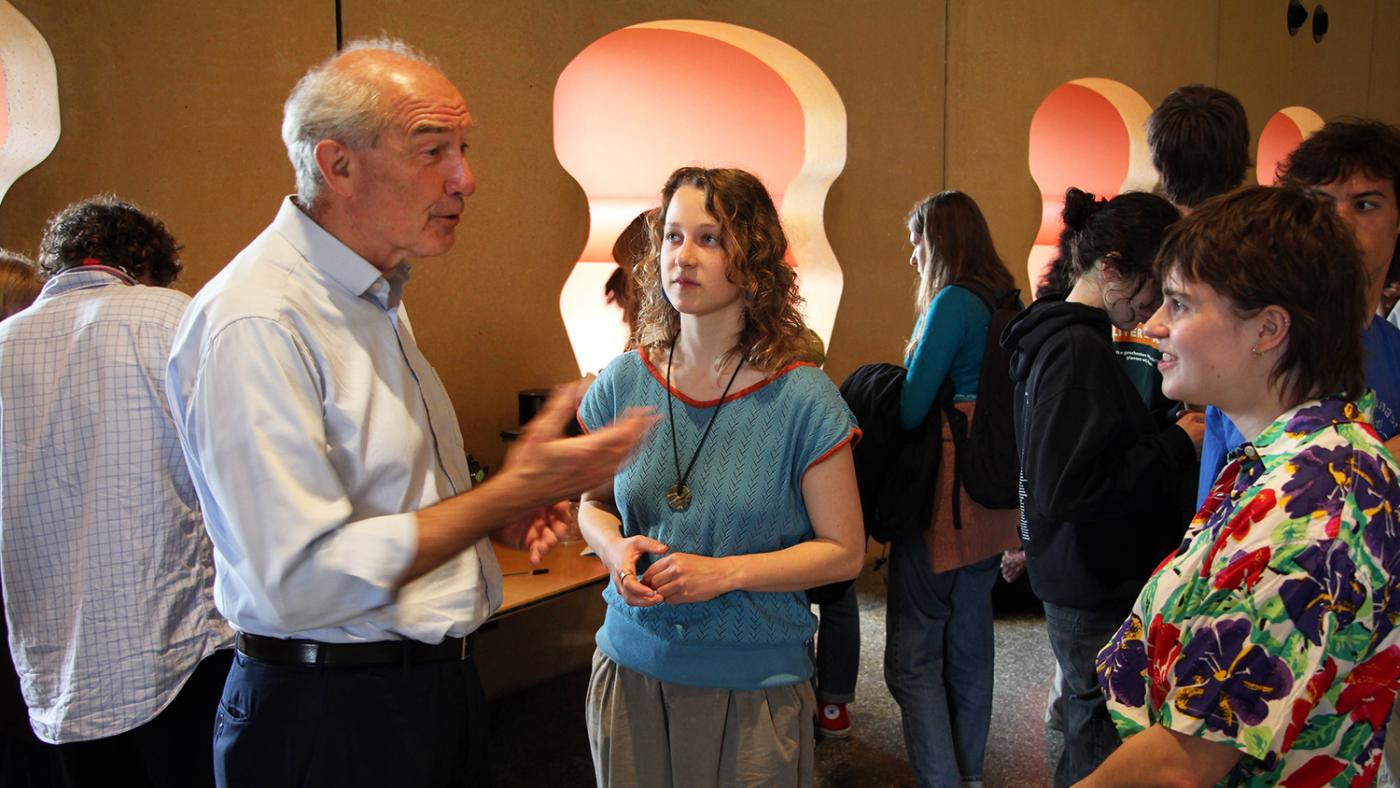
Pijpers does not shy away from leading the pack, but also knows that everyone needs to be on board if we want to reach the finish line together. He strives to perform, but does not need to be in the limelight himself.
This is how the university's former Director of Communications, Cor Jansen, describes the outgoing University President Anton Pijpers. They have made several long trips together on their racing bikes. The time they did the 540-kilometre, 23-hour-long Styrkeproven from Trondheim to Oslo, Norway, alongside 10 other friends is etched in both their memories.
The sporting analogies Jansen is known for suit Anton Pijpers, who used to be a talented speed skater in his youth. He skated the Elfstedentocht (the world's largest ice-skating tour, almost 200 kilometres long, Ed.) three times. Such comparisons also align with what we hear from Pijpers' administrative network about their experiences with the man who chaired Utrecht University for eight years and is now retiring.
Many of them describe Pijpers as a “connector” and a “bridge builder”, a master at uniting people with different interests. At the same time, he always took responsibility when necessary. He was a university president who “led by example”, they say.
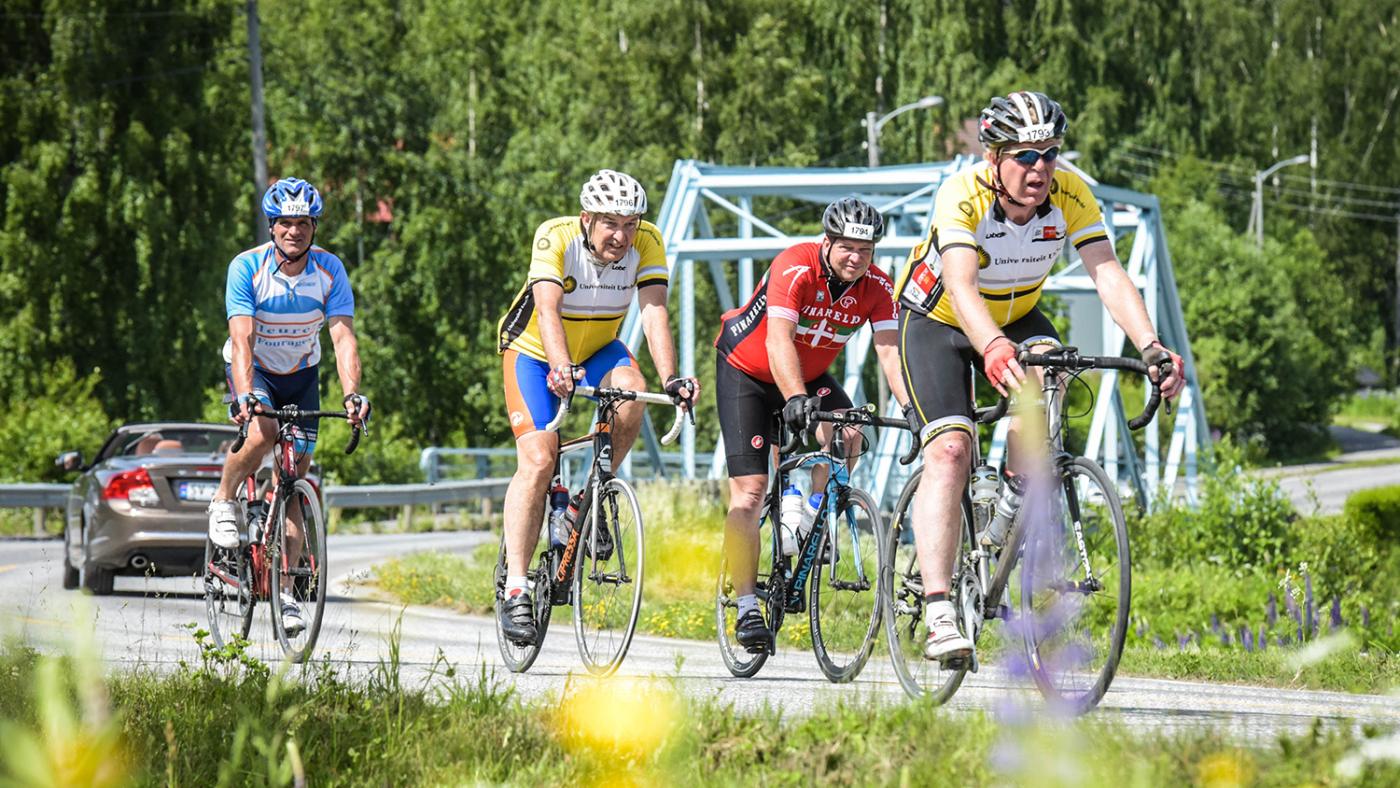
Photo: Pijpers' personal archive
"As a president, he sets the tone"
Deans Isabel Arends, from the Faculty of Science, and Thomas Vaessens, from the Faculty of Humanities, make no secret of their admiration. Both praise the collegial relationships and open culture of debate within the university, including at the administrative level. According to these two deans, this is largely thanks to Pijpers' work.
"As a president, he set the tone," says Vaessens. "At Utrecht University, we are proud of how we have organised cooperation across faculty and departmental boundaries, but things also have to work on a human level, and Anton embodied that very much. A division never arose during an administrative meeting, which he favoured. I have had a very different experience in other places.”
Arends: “I came from the University of Delft, where meetings were something that mainly took place in the evenings and had lots of documents and presentations. Anton really strived towards what he called 'open conversations'. He would listen and say: 'Let's talk about it'. I came to appreciate that very much."
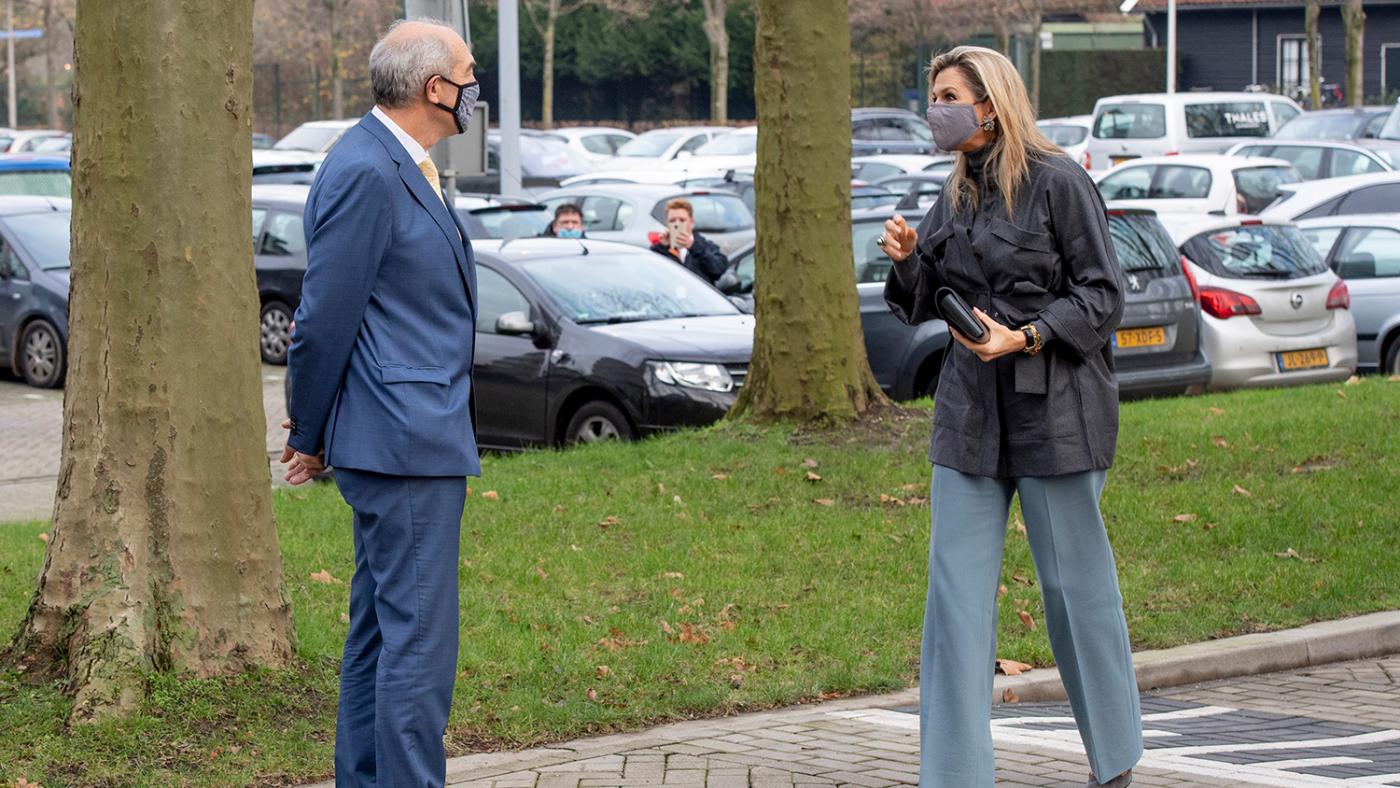
Queen Maxima visited Utrecht University in 2020 to learn about the impact of the coronavirus pandemic on students and staff. Photo: Brunopress, Patrick van Emst
Anton Pijpers emphasised the importance of leadership at the university, especially in recent years, when issues such as social safety and workload have received increasing attention. He eagerly spread what he called the "UBAA" rule of thumb — an acronym for Uitspreken, Bespreken, Afspreken en Aanspreken (Speak Up, Discuss, Agree, and Address, Ed.).
Arends is closely involved in the university's new leadership program, which Pijpers spearheaded. "Deans and board members are also expected to take courses, and they don't always have the time or inclination to do so, but Anton was always the first to emphasise the importance of attending."
"When Anton is around, you see solutions rather than problems"
According to several interviewees, Pijpers has a “goodwill factor” due to his relaxed, informal manner. He does not come across as a smooth communicator, but is amiable and sincere, and has no big ego. His style is described by one person as "rather unpolished, somewhat angular". This is where his Veterinary background occasionally shows through.
Leonie Gerth, a student member of the University Council, also mentions his talent for making meetings “relaxed” and "light-hearted". She says: "He also has a characteristic pose, sitting back in his chair with his legs stretched out and crossed. Very comfortable."
She also recognises Pijpers as a connector: "If he notices that a student member is concerned about something, he will suggest continuing the discussion on a topic, or explain an answer in more detail. That is to his credit."
Jansen agrees: "When Anton enters the room, people think in terms of solutions rather than problems. They have a zest for work rather than a workload. Administrative calm rather than a volcanic eruption. He's just a tough administrator."
"He is almost a diplomat"
Pijpers was also an influential figure outside the university, our interviewees tell us. He is widely praised as the dealmaker who ensured that Dutch universities, in association with the umbrella association UNL, took control of reducing the number of international students.
This prevented a harsh crackdown from the Minister of Education, Culture and Science, which would have scrapped English-taught Bachelor's programmes on the basis of a language test. The "broad" universities in the Randstad region (a conurbation encompassing cities such as Amsterdam, Rotterdam, The Hague, and Utrecht, Ed.) were particularly at risk of being hit hard by this measure.
When Pijpers took office, there were still doubts as to whether this scientist's connections in The Hague were in order. Becoming a university president after serving as a faculty dean was not a common trajectory at the time, even though Pijpers had also served on the Executive Board. Now, most people are enthusiastic about how Pijpers fulfilled the role of UU President on the national stage. “He's almost like a diplomat," says Arends. "He keeps an eye on the common goal and visits the administrators one by one to discuss all issues.”
Annelien Bredenoord, President of the Rotterdam University of Applied Sciences, confirms this impression and praises Pijpers' "to-the-point" style. "It was a very difficult case, but Anton remained calm when emotions ran high and knew exactly how to identify the tough issues. He managed to convince everyone that a collective approach is better for Dutch academia. In the end, all universities were willing to contribute."
According to Bredenoord, Pijpers also has an "eye for people", and that helped. As an illustrative example, she mentions that he did not forget which university president ("I won't say who") always likes to have chips at dinner. He ensured that each person was served their own bowl of chips at the Utrecht Faculty Club.
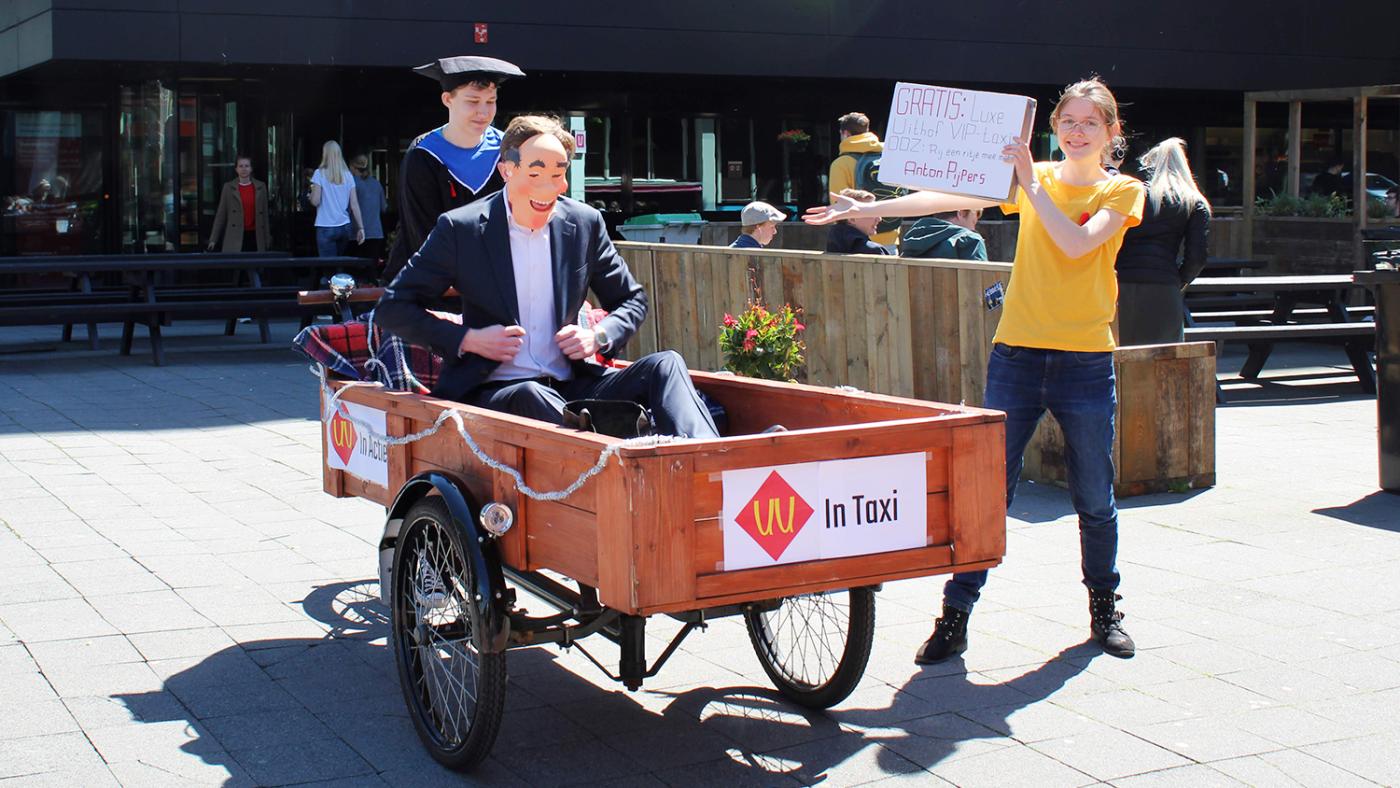
Photo: DUB
'Typisch voor Anton; laten zien voor welke waarden je staat'
Nevertheless, Pijpers has faced some hard confrontations. For example, the infamous clash with the University Council over his own expense claims haunted the university president for a long time. It was clear that he had not taken any unnecessary trips, and most people understood his explanation that his high travel costs were related to the salaries of two drivers who were still employed by Utrecht University at the time. Nevertheless, the student factions felt that the Utrecht University president had miscalculated his expenses.
Pijpers himself ultimately had to acknowledge that his travel expenses were unjustifiable. The drivers have since been dismissed, and Pijpers moved from Zutphen to the Vogelenbuurt, a neighbourhood in Utrecht from which he can cycle to the Administration Building. The university community appreciated this move. “Typical Anton,” says Cor Jansen. “Showing the values you stand for.”
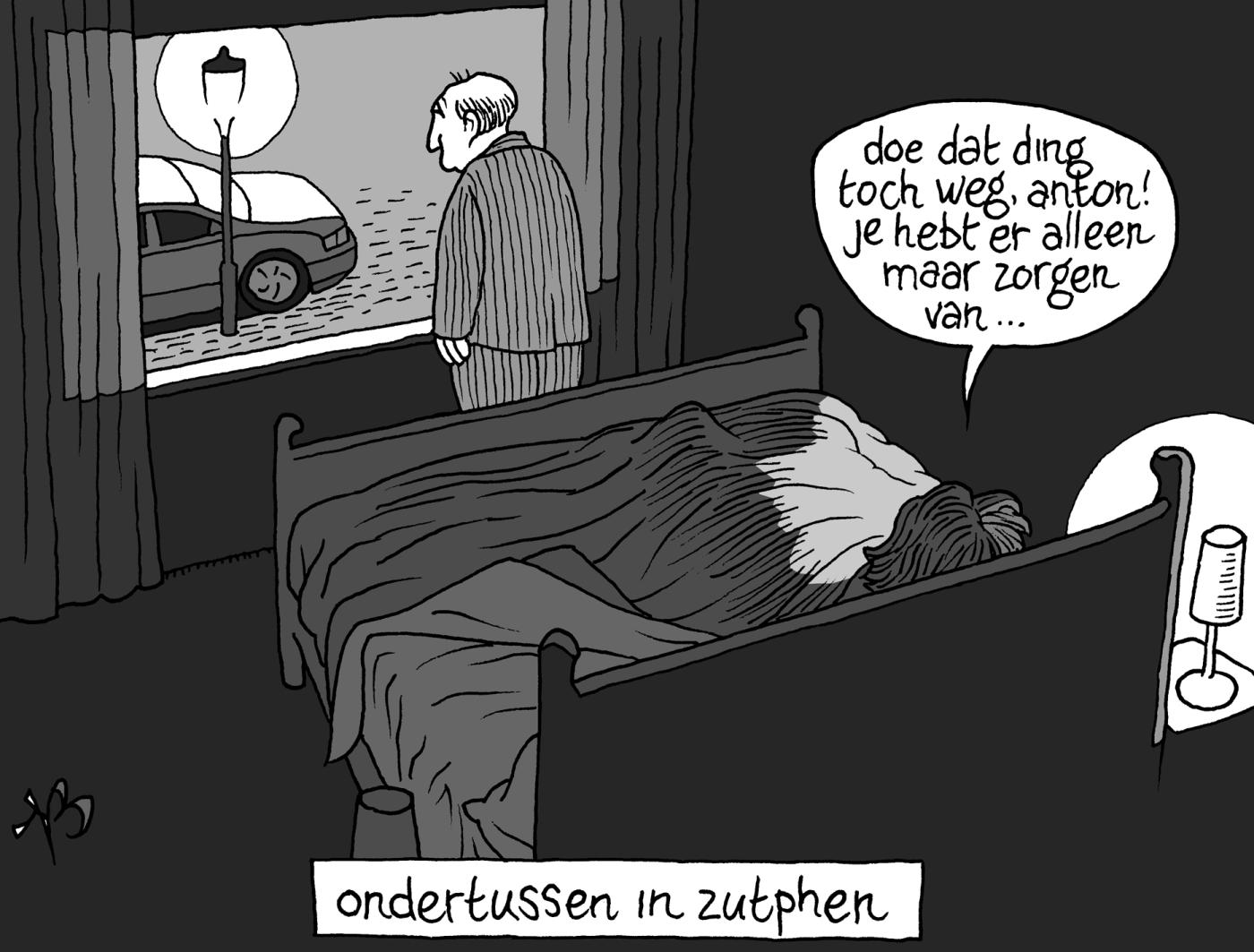
"Just get rid of that thing, Anton. It causes nothing but hassle..." Cartoon by Niels Bongers, 2019.
“Men like Anton consider their own reputation to be the most important thing.”
Floris Boudens, a former History student and student council member, looks back on that episode differently. He was the one who raised the alarm about the issue and tipped off a GroenLinks (Green Left) MP. As a result, the UU president made national headlines.
"I was summoned to Anton Pijpers’ office," Boudens recalls. "He felt that I had portrayed him as a greedy person. That was what he wanted to say, and then I was free to leave. The conversation lasted a few minutes."
"The next time we talked was during the council meeting that was convened specifically to discuss travel expenses. We shook hands after that, and a picture of that moment was taken, which the national newspaper Trouw would publish. Apparently, everything was fine again. I felt that it was mostly for the cameras, though."
“My conclusion at the time was that men like Anton Pijpers consider their own reputation and that of the institutions they represent to be the most important thing."
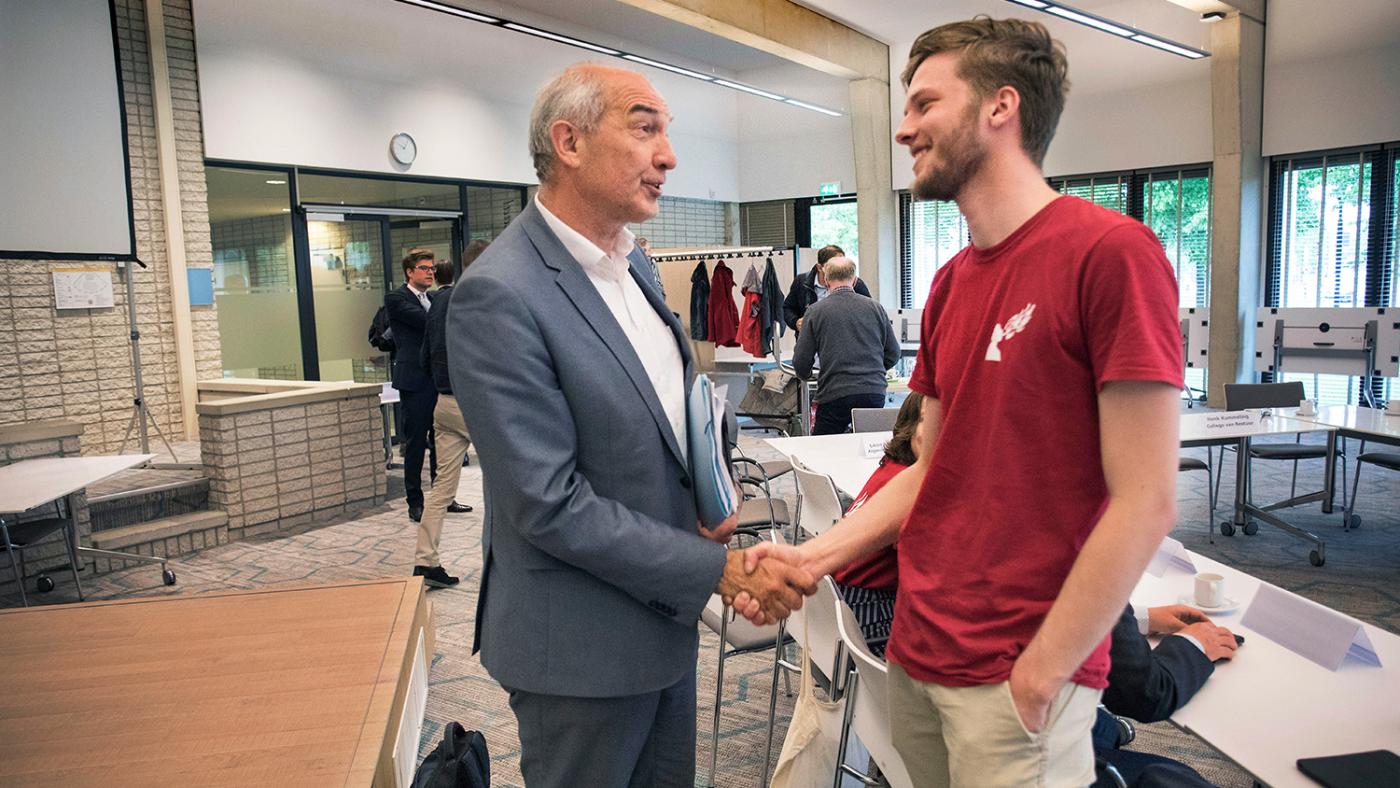
The picture of Anton Pijpers shaking hands with Floris Boudens, which Trouw published. Photo by Werry Crone
If you ask Pijpers' colleagues what issue has preoccupied him most recently, the answer is clear: the occupation of UU buildings by pro-Palestinian activists. For the first time, the university president was unable to keep the parties at the table and maintain a dialogue.
During the many discussions on the subject in the University Council, student council member Leonie Gerth felt that the issue was weighing heavily on Pijpers. "I remember a meeting where we discussed a previous occupation. Anton was checking his phone the whole time, and at one point he said: 'Sorry, there seems to be another occupation, I've got to leave. I must be there to talk to people."
Many people across the university admire Pijpers for turning up to talk to activists on the street, using a megaphone to order the occupiers to leave, going home under police escort, and returning in the morning with security staff to assess the damage.
"He remained calm, stoic, and above all dignified"
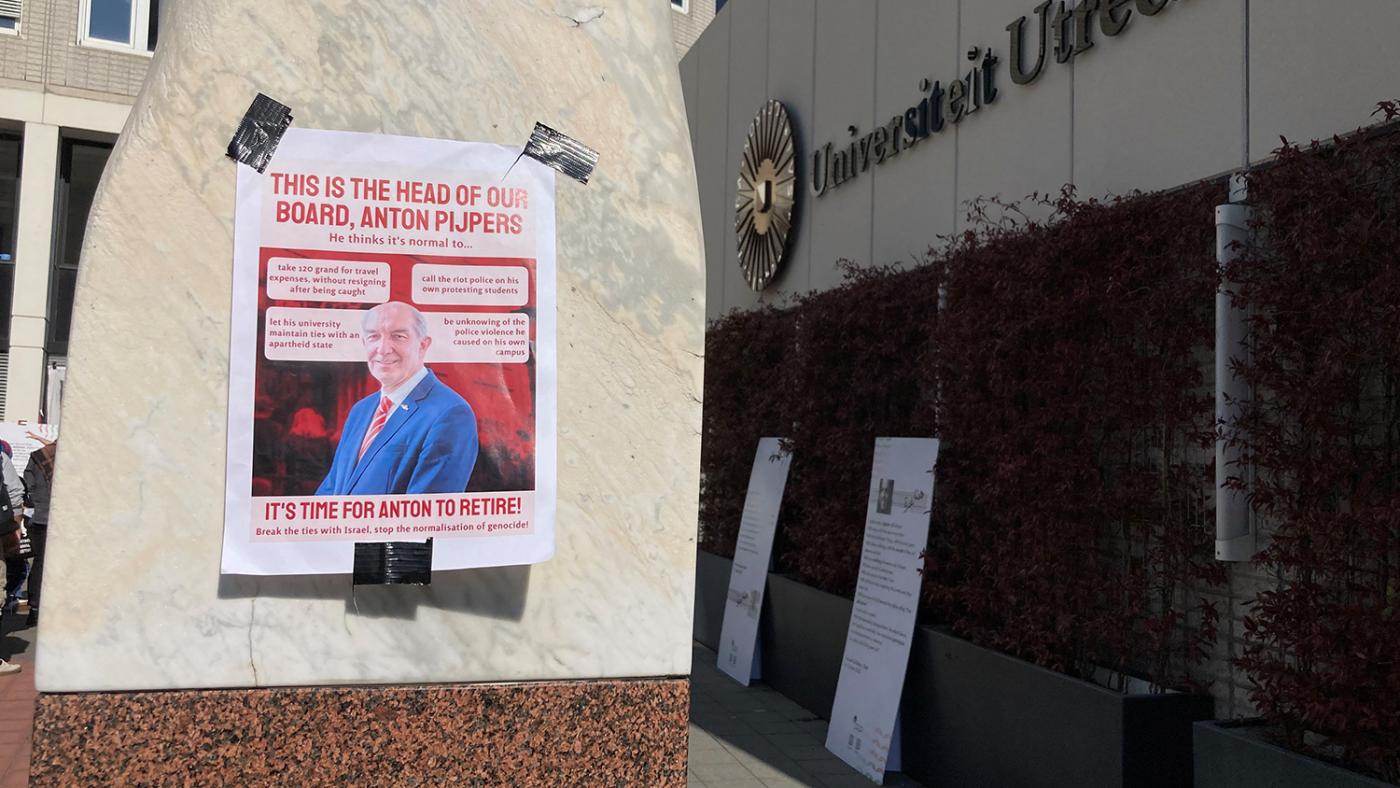
Photo: DUB
Thomas Vaessens, Dean of the Faculty of Humanities, says: "He struggled with hopelessness. That dialogue was truly impossible, and he was blamed for it. There are stickers and slogans about him in the buildings, as if he personally had blood on his hands. This is unacceptable, yet he remained calm, stoic, and, above all, dignified. He did not participate in publicity stunts to influence public opinion. He just kept on standing there.”
When Anton Pijpers stepped down from the University Council last week, Jonathan Koelewijn, first a student member and now a staff member of the University Council, praised Pijpers for his accessibility, even during difficult or grim situations such as the occupations. “He set a good example and took responsibility. He was a true figurehead for the university.”
However, many students and staff members do not see Anton Pijpers as a mediator in this case. They, too, suspect that many of his actions were merely for show. The Law student and pro-Palestinian activist Itaï van de Wal talked to the university president several times in front of occupied buildings. He says he does not feel that Pijpers was genuinely interested in the occupiers' story and mainly showed up “just to be able to say that he had tried”.
"He kept repeating his own point of view over and over, and firmly stuck to the agreed line. What we remember most is that his arrival was always followed by the deployment of the riot police," says Itaï.
Regarding the posters and stickers in which Pijpers is personally accused, Van de Wal says: "I guess it annoyed him, but this man has enough power not to have to worry about that too much. We have sometimes been approached by security guards or spokespeople, requesting that we remove them. So maybe it did affect him, but I can't say much more about that."
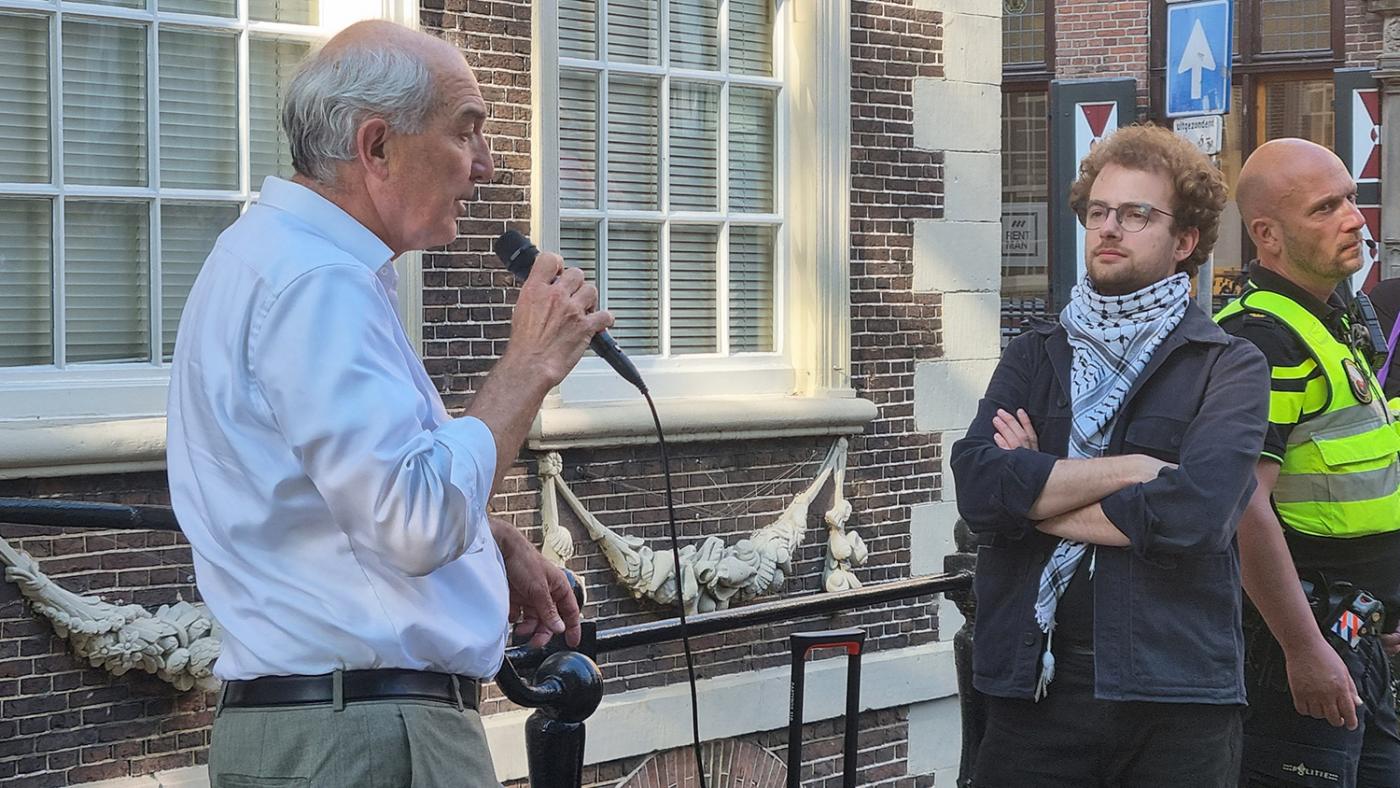
Anton Pijpers talking to Itaï van de Wal. Photo: DUB
Pijpers was also criticised in the University Council when he introduced strict rules on demonstrations at Utrecht University (in consultation with other universities). The students questioned the legal validity of these house rules and demanded more information. Ultimately, Pijpers relented, and less stringent rules were put in place, following advice from the Study & Information Centre for Human Rights (SIM).
Leonie Gerth: "Things got pretty heated at times, but he was also understanding of our position. He always said that he thought it was important for the University Council to be well-informed. Whether that always works out is another matter: we have many complaints about documents being delivered too late. That is also his responsibility."
"Then he got angry, and he should be."
His actions on the Palestine issue are cited as an example of Pijpers's ability to keep a cool head under all circumstances. "The more tense the situation gets, the calmer Anton becomes," we hear. "He's not afraid of anything," says another interviewee.
Several of the sources we have spoken with say they have never seen Pijpers get angry. During his farewell speech last week, University Council Chair Wim de Smidt said that he could only remember Pijpers showing "subtle anger". In these occasions, the UU President "suddenly addressed us formally."
The other time people have seen him get angry was when he thought that cleaners, receptionists and security guards were treated unfairly by pro-Palestinian activists. Pijpers even wrote an op-ed about this for DUB. Dean Thomas Vaessens: “Then he got angry, and he should be. These are his people.”
When people are asked whether Pijpers has a soft spot, they mainly mention issues related to less fortunate events that have befallen his close colleagues at Utrecht University. For example, he was deeply affected by the recent death of Campus & Facilities Director Eddie Verzendaal.
"Anton, the man, is not always visible during University Council meetings," said UU council chair Wim de Smidt in his speech last week. "But the man is concerned about the climate, students' use of resources, and the well-being of individual colleagues."
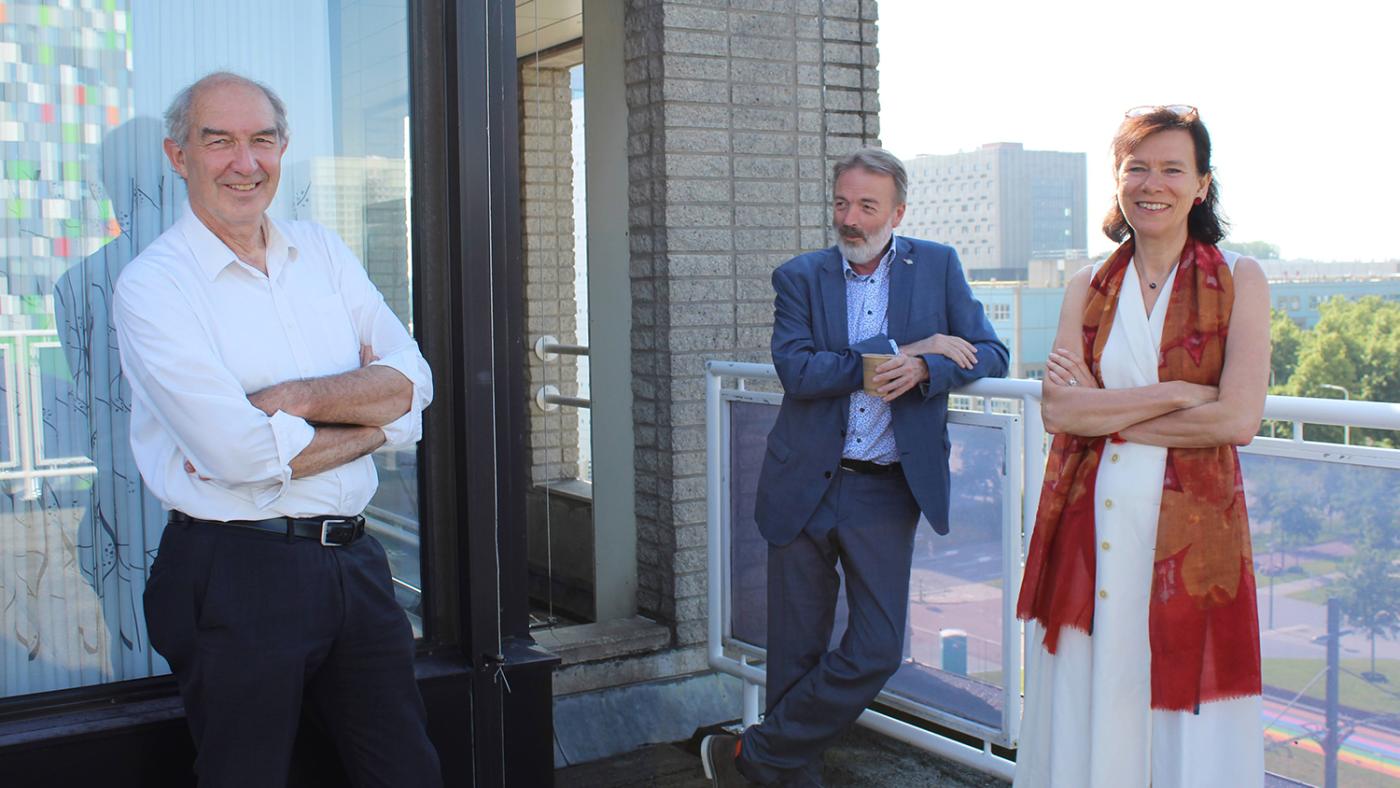
The relaxed and engaging director, who never lets things get to his head, was no different behind the scenes than he was in public, according to Isabelle Oorschot, Pijpers' assistant for the past year and a half. "You can tell from everything he does that he enjoys his work. I have never seen him grumpy or stressed. We usually tell people that they should have some fun after they retire, but with Anton, I get the feeling that he has always done fun things."
"He's also a people person," Oorschot adds. "He enjoys having a chat in the morning. Not because he has to, but out of genuine interest." According to Oorschot, it helps that Pijpers understands the art of trusting others. "I manage his mailbox and schedule, and he trusts me to assess what is urgent and what is less urgent. It was a well-oiled machine, which made working with him very pleasant. And when I occasionally bought a beef sausage sandwich from Broodje Ben, I could do no wrong."
We are told that Pijpers' management style has guaranteed administrative stability. He was not a man of grand visions, comprehensive views on university education and research, or the future of the university. "He was above all a great steward," says Jansen.
However, according to some, his focus on administrative harmony and workable compromises also had a downside. Pijpers is intelligent, smart and full of ideas, but sometimes his ideas remain rather abstract.
Dean Isabel Arends: "Since he listened to everyone and showed understanding for dilemmas, some people were disappointed when they wanted to take immediate action and get things done. He remained the man of broad outlines and held back, which is understandable, of course."
The Dean of the Faculty of Science greatly appreciates Pijpers' support of the entrepreneurial university. He was a key supporter of UU's successful applications for the national growth fund. According to her, he also worked tirelessly to strengthen the “ecosystem” of regional knowledge institutions.
“Sometimes, he got frustrated by that. In the dean meetings, he constantly asked for concrete examples that he could use to show the outside world that Utrecht University is truly special. In his opinion, we dwelled too much on generalities about how well we work together and that all disciplines are represented here."
“He will be there for you if you need him.”
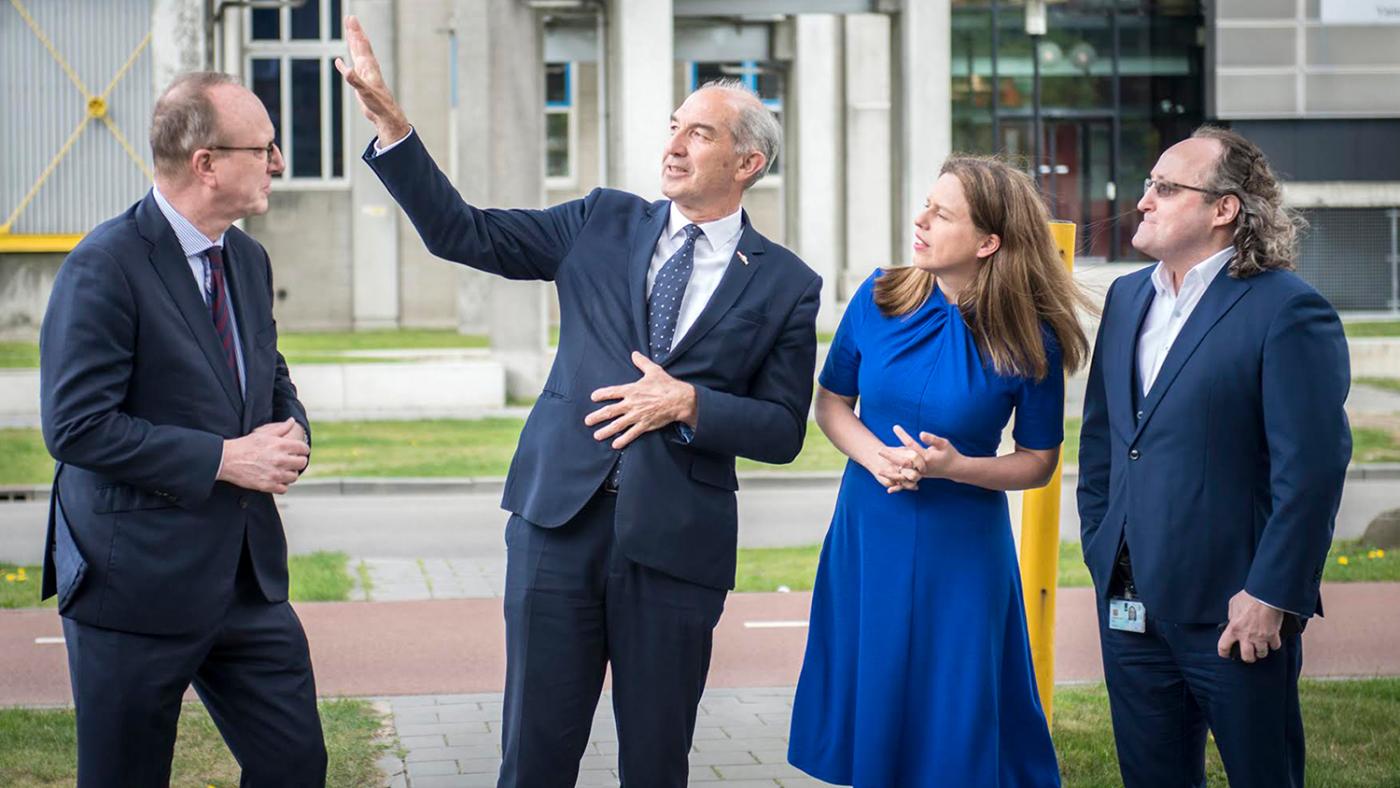
Carola Schouten, then Minister of Agriculture, Nature and Food Quality, visits the Faculty of Veterinary Medicine. Photo: Lisanne Rooth-Van der Voort
Jan Henk van der Velden, Director of the Utrecht Science Park Foundation, also praises Pijpers for his commitment to the “valorisation” of university education and research. "This remains a neglected area for many scientists, but not for Anton."
As a landowner, Van der Velden points out that Utrecht University provided space for the Accelerator Building at Utrecht Science Park, enabling large listed R&D companies to continue to grow. According to him, this contributed to transforming Utrecht Science Park into a major biotech powerhouse. "The fact that a company like Merus was acquired by its neighbour Genmab for 8 billion, allowing both companies to remain here, is also thanks to this. The development of successful cancer drugs will thus remain in Utrecht, but also in the Netherlands and Europe."
According to Van der Velden, Anton Pijpers played a role that should not be underestimated. "What's really nice about Anton is that you can always communicate with him quickly and easily. He will always be there for you when you need him or when his input is really needed."
Cor Jansen also sees the university president as an exemplary ambassador for the city. He particularly recalls the year 2015, when he was one of the key figures behind the initiative to bring the Tour de France to Utrecht. According to him, Pijpers was the perfect host when the cycling event passed through Utrecht Science Park.
"The entire organisation team of Tour de France sat together with the four Dutch tour winners at the Dom Church for UU's anniversary celebrations. Anton asked the director, Christian Prudhomme, to present the Teacher Talent Award. He was as excited as a little boy."
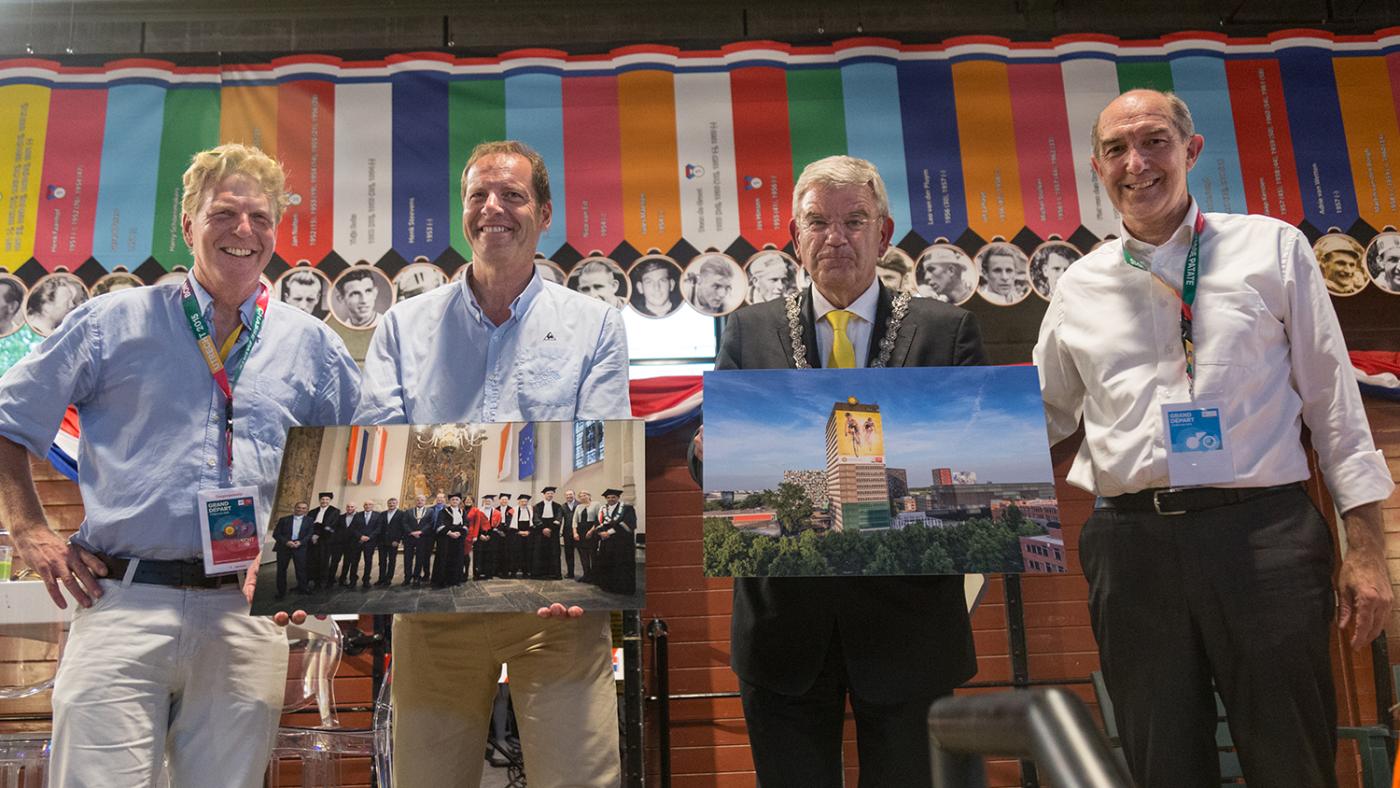
Anton Pijpers and Cor Jansen with Tour de France Director Christian Prudhomme at the team presentation. Photo: Brechtje Jansen
When it comes to issues in which Pijpers was unable to achieve what he wanted, one can think of the great difficulty the university president had in getting the faculties to spend more money.
The university lobbied The Hague for years to get additional funding, even though there were large surpluses year after year. A difficult story to sell. Pijpers believed that the university needed to tighten its belt and hire more permanent staff. Ultimately, the Executive Board decided to allocate 50 million euros from its own funds to ease its staff's workload. However, that battle has since been rendered moot by the government's austerity measures.
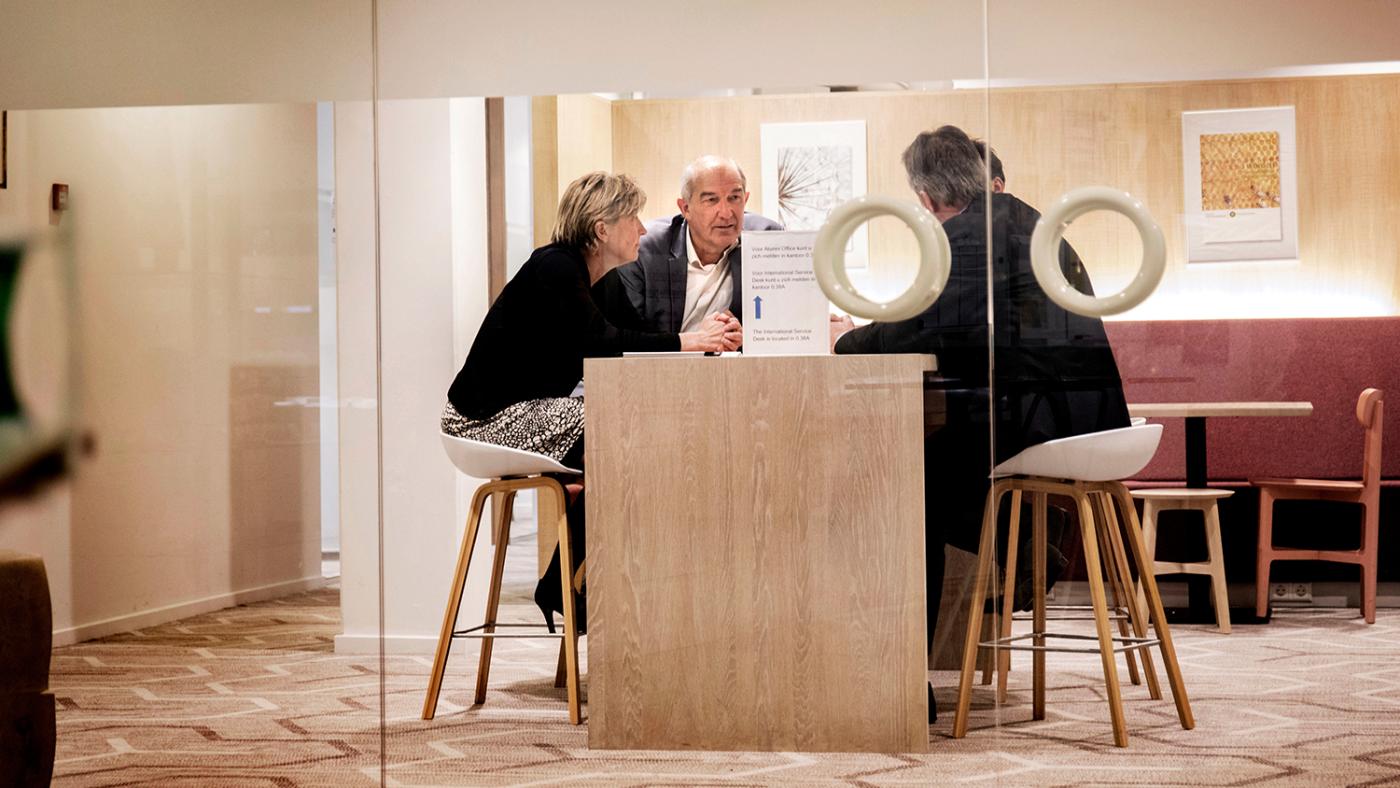
Photo: Werry Crone
Instead, our interviewees now refer to the frustration Pijpers still feels about how slow the renovation of old buildings and the construction of new buildings is progressing at Utrecht Science Park. Plans for the Kruyt Building and the Van Unnik Building had to be revised several times.
Many students of the Faculty of Science still remember the tumultuous meeting in which Pijpers and the then Director of Real Estate & Campus had to defend the unpopular plan to renovate the Kruyt Building in stages. That plan was ultimately scrapped, but the pace of student housing construction was also too slow, according to the university president.
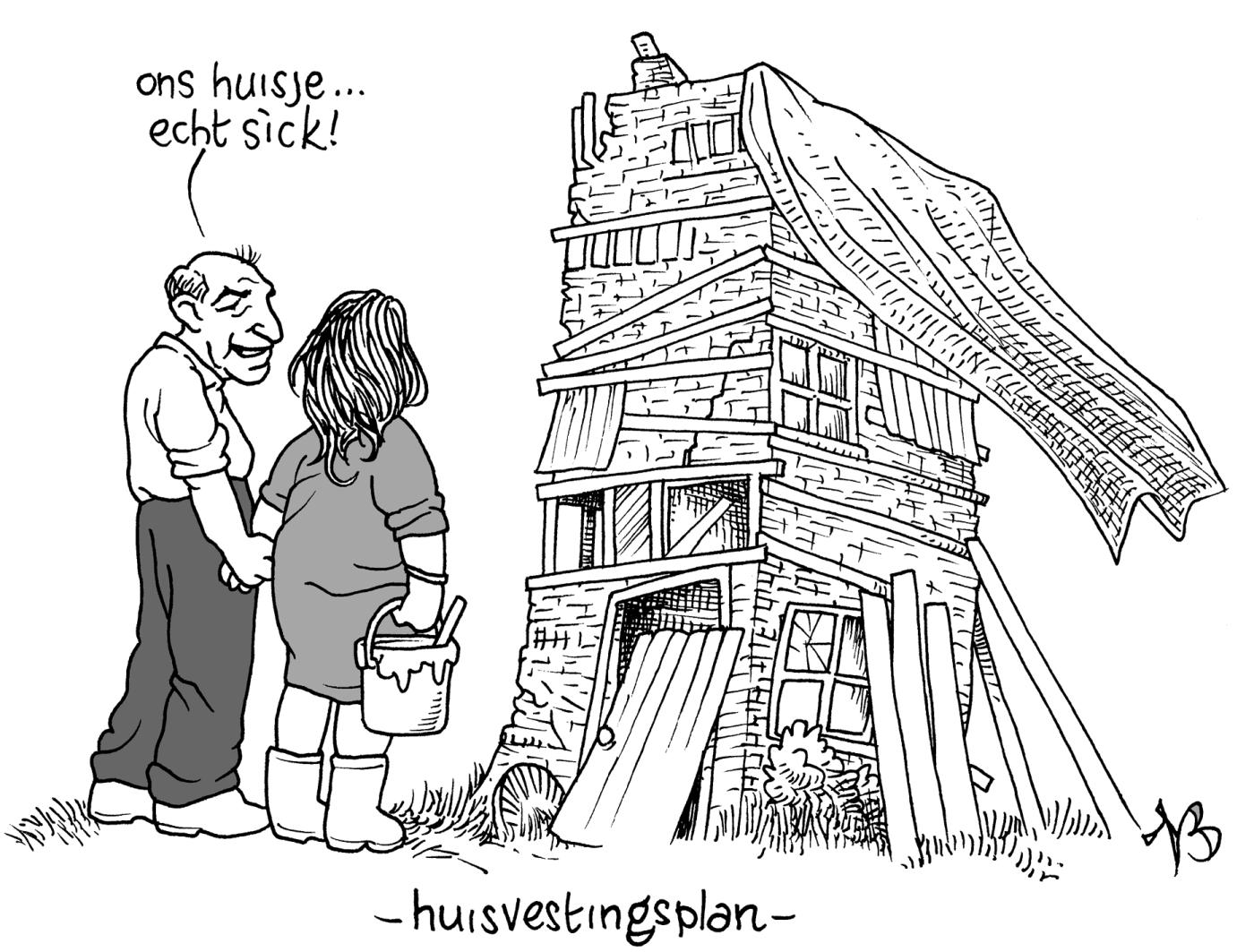
"Our little home... So sick!" Cartoon: Niels Bongers, 2019
“He would have liked to see Utrecht Science Park become livelier”
And then, of course, there was the plan to make sport “the heart” of a vibrant campus. In the new vision for Utrecht Science Park, Pijpers attempted to have the Olympos Sports Centre relocated to where the Kruyt Building stands. Ultimately, this plan failed for several reasons. “He would have loved to see Utrecht Science Park become more vibrant, with campus-related housing, a rowing course and a lively atmosphere around the sports fields in the central area,” says Cor Jansen.
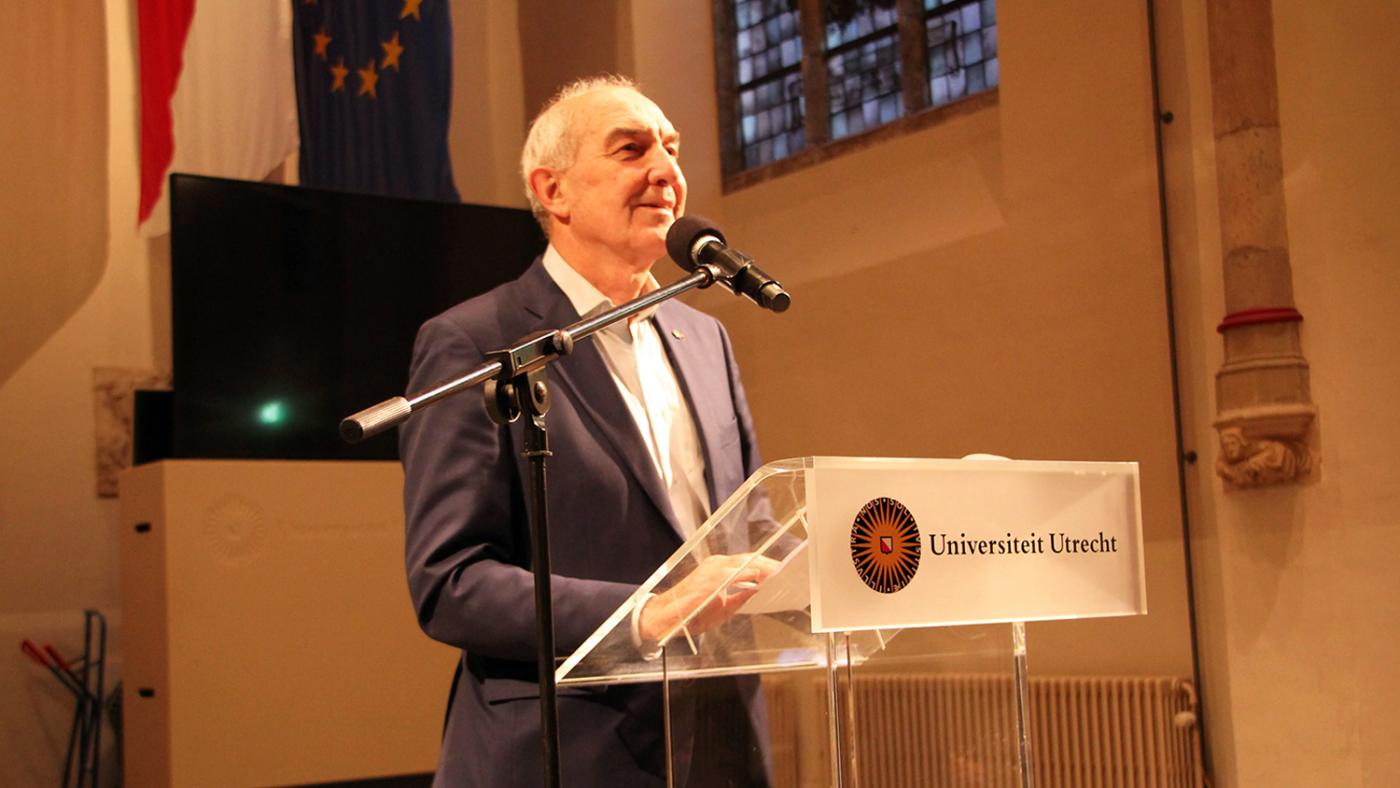
Photo: DUB
It has been suggested that the most decisive factor in the much-mentioned goodwill factor enjoyed by the UU President was probably his long history with the university.
He first came to UU as a Veterinary Medicine student forty years ago. With the exception of a nine-year stint as Director of the General Animal Health Service, he remained loyal to Utrecht University. “I feel like a UUer through and through,” Pijpers often said.
It helps when people notice that the president loves the university and knows it inside out, according to one of our sources. "That university song, 'My UU', suits him perfectly."
Aantredend hoofdredacteur van DUB Bas Mesters interviewt vertrekkend voorzitter Anton Pijpers tijdens zijn afscheidsbijeenkomst op 13 november. Van dat interview zullen we een weergave publiceren.
Ik heb de man nooit mogen ontmoeten (wel een keertje rond zien lopen), maar ik vond hem altijd wel sympathiek als ras-UU'er in het bestuur. Dank voor uw jaren van dienst, Professor Pijpers